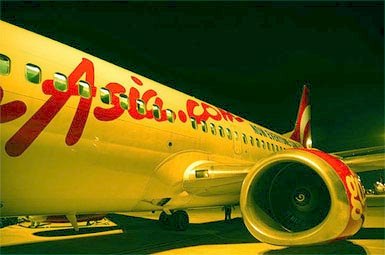AirAsia forges ahead despite air travel slowdown
 Kuala Lumpur - Malaysia's budget airline AirAsia hopes to soar above the current global travel slump by defying the conventional, and introducing unorthodox mechanisms to increase passenger volume.
Kuala Lumpur - Malaysia's budget airline AirAsia hopes to soar above the current global travel slump by defying the conventional, and introducing unorthodox mechanisms to increase passenger volume.
With travel experts predicting a major drop in tourism across the region, airlines across the board have taken to cutting back on growth and routes to reduce capacity and match lower demand.
AirAsia, however, has chosen to fly the path less travelled.
Following the drop in global oil prices, the airline became one of the first in the world to launch a no-fuel-surcharge scheme earlier this month, where passengers need only to pay the cost of the ticket, with airport and administration charges.
The carrier, widely considered to be the region's most successful budget airline, also announced it would be offering 500,000 free seats covering all its destinations.
"There are two ways of dealing with the crisis. One is to put your head in the sand and cry every day, and wait for the inevitable," said Tony Fernandes, AirAsia chief executive officer.
"The other, is to try and do something about it."
Fernandes, credited with transforming the airline from a heavily indebted company in 2001 to become the region's largest budget airline today, said the move was aimed at boosting air travel at a time when holiday-makers were choosing not to fly.
"We will continue to look for ways to stimulate demand, and I believe by taking unconventional steps, we'll be able to beat the odds," Fernandes told Deutsche-Presse Agentur dpa.
Despite his optimism, analysts are already forecasting difficult months ahead for the travel industry.
"The next few months to a year are going to be definitely difficult periods, not only for this region but the world," said Andrew Herdman, director-general of the Association of Asia-Pacific Airlines.
"Last year, we had record-high numbers of passenger volume but in just the past few months, there has been a major drop.
"Things are expected to be worse in the next year," he said.
The association recorded 10.98 million passengers in September 2008, a 6.6 per cent dip from the same month a year before.
Freight traffic fared even worse, falling 9 per cent despite September being the peak shipping season.
Herdman predicted there would be more than a few "failed airlines" in the months to come.
"The challenges to airlines apply to all, regardless of the business model, whether long haul, short haul, budget or not," he said.
"Right now, it's not a matter of "if" you are suffering losses. It's a matter of when and how much longer you can survive."
He said airlines needed to adjust their capacity to match the drop in travel demand, adding that most carriers have already cut back on routes, reduced head count and retired older and less fuel-efficient planes.
But far from cutting back on routes, AirAsia is set to fly from December 1 to a new destination: India.
"It's a classic way of dealing with the slump. In the past two weeks, we've been able to sell out all our seats for December (to India)," Fernandes said.
"We could have said, "Don't expand now" but then, we'd have lost out on all the extra passenger volume we're now enjoying."
While Herdman cautioned that AirAsia's approach was not without its risks, especially in obtaining secured financing for its expansion plans, he applauded the carrier for "focusing on the long-term."
"I'm confident the outlook for travel in the region remains bright in the medium and long term.
"There will be an increase in travel, especially in this region, if airlines can weather this crisis. Airlines will come out of this stronger," Herdman said.
Fernandes said the slowdown would not stop AirAsia from breaking new ground, whether it is on purchasing new, fuel-efficient aircraft or expanding its routes.
"Wherever there is a cloud, there is a silver lining," said Fernandes.
"We will remain focused on the possibilities, and not on the problems." (dpa)